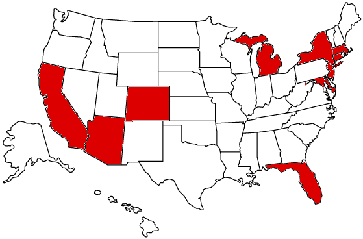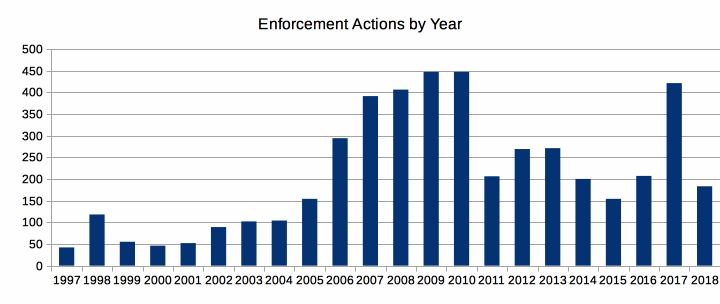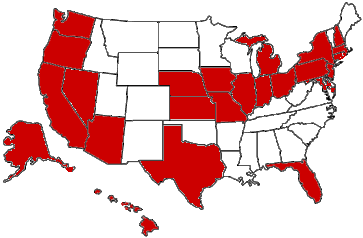Can’t say for sure, but the latest update to the Enforcement Action Database seems to suggest it, as the agency considers drastically cutting their already meager ranks. As of the end of April, there’ve been just 35 enforcement actions against 17 stations in four states. There has been no official report of field activity in May. In 2014, there were 52 enforcement actions in the same time-frame.
 2014 saw the lowest level of FCC enforcement activity against unlicensed broadcasters in nearly a decade. Where agents are active, New York continues to lead the way, followed by New Jersey and California. A station in Colorado also got a warning letter this year, but that was a follow-up to a visit last year. Continue reading “In Face of Downsizing, Are FCC Agents Pulling Back?”
2014 saw the lowest level of FCC enforcement activity against unlicensed broadcasters in nearly a decade. Where agents are active, New York continues to lead the way, followed by New Jersey and California. A station in Colorado also got a warning letter this year, but that was a follow-up to a visit last year. Continue reading “In Face of Downsizing, Are FCC Agents Pulling Back?”
Tag: new jersey
Massive Cuts Planned to FCC Field Enforcement
A very interesting memorandum was leaked last week to two trade publications detailing a plan to severely reduce the FCC’s enforcement presence in the field. Presently, the agency’s Enforcement Bureau has two dozen field offices scattered throughout 17 states and Puerto Rico. However, not every field office is created equal: there are Regional Offices (many employees), District Offices (a handful of employees) and Resident Agent Offices (one or two people).
According to the American Radio Relay League, two-thirds of all FCC Enforcement Bureau offices would be closed, leaving just half the staff (33 people total) in the field. And their management is positively evicerated: reduced from 21 positions to just five. Continue reading “Massive Cuts Planned to FCC Field Enforcement”
FCC Steps Down Anti-Pirate Enforcement
Just updated the Enforcement Action Database and the signs are pretty clear: unlicensed broadcasting has slipped down the priority-list for FCC field agents. Actions against AM/FM and shortwave pirate stations last year were at their lowest level since 2005, the last time fewer than 200 were logged.

Tactically, even the agency’s penchant for paperwork seems to have slackened. Continue reading “FCC Steps Down Anti-Pirate Enforcement”
Library of Congress Launches Local Radio Preservation Project
I mentioned this initiative a few months ago when I first heard about it, but the details have only recently been released. Can you help us assemble a national archive of local radio broadcasts?
The official name of this project is the Radio Preservation Task Force, being conducted under the auspices of the LoC’s National Recording Preservation Board. For many years, the NRPB has pursued various study-strategies to get a sense of just how much of our nation’s broadcast history has actually been preserved.
Turns out, it’s not much: sure, you can easily find and watch pretty much any of the “Big Three” national TV newscasts of the last 40+ years, but radio has no such archive, and local radio is especially unremembered. The Radio Preservation Task Force hopes to change that, with special focus on radio broadcasts from 1922-1980, and especially those from the noncommercial, educational side of the medium. Continue reading “Library of Congress Launches Local Radio Preservation Project”
Massachusetts Mulls Anti-Pirate Law
Lawmakers in Massachusetts are hard at work trying to outlaw unlicensed broadcasting. H.1679 was introduced in the state House of Representatives in January and got a hearing in the legislature’s Joint Committee on the Judiciary just last week. Floor votes are expected before the end of the year.
If approved, Massachusetts would become the fourth state in the country to pass an anti-pirate radio law. Continue reading “Massachusetts Mulls Anti-Pirate Law”
Pirate-Hunting: FCC Plods While Local Scenes Bubble
Halfway through 2013, and the FCC’s pace of unlicensed broadcast enforcement shows no real change from 2012: 106 enforcement actions in all, targeting more than three dozen stations, with the majority of this activity wholly administrative in nature. Pirate stations who appear on the FCC’s radar can now expect a warning letter to arrive via certified mail 1-6 weeks after an initial visit. Ignore those, and the agency may start asking for money.
 To date, the FCC has handed out $60,000 in Notices of Apparent Liability and $125,000 in actual forfeitures. However, not all of these penalties are new: in February, the FCC socked Whisler Fleurinor with a $25,000 fine for unlicensed operation in Fort Lauderdale, Florida. This is actually Fleurinor’s second go-round – he was first busted in 2010 and given a $20,000 forfeiture in 2011, which was later reduced to $500. It’s much the same story for Gary Feldman, who was first busted in 2004 for pirate broadcasting in Miami. He was caught again last year and fined $25,000 this year. Moreno’s 2004 forfeiture ($10,000) was never paid. Continue reading “Pirate-Hunting: FCC Plods While Local Scenes Bubble”
To date, the FCC has handed out $60,000 in Notices of Apparent Liability and $125,000 in actual forfeitures. However, not all of these penalties are new: in February, the FCC socked Whisler Fleurinor with a $25,000 fine for unlicensed operation in Fort Lauderdale, Florida. This is actually Fleurinor’s second go-round – he was first busted in 2010 and given a $20,000 forfeiture in 2011, which was later reduced to $500. It’s much the same story for Gary Feldman, who was first busted in 2004 for pirate broadcasting in Miami. He was caught again last year and fined $25,000 this year. Moreno’s 2004 forfeiture ($10,000) was never paid. Continue reading “Pirate-Hunting: FCC Plods While Local Scenes Bubble”
Miscellaneous News of Note
A crash-course in the dramaturgy of media studies has the mind fully occupied at the moment, but not quite busy enough to do other stuff quasi-related to this site: Continue reading “Miscellaneous News of Note”
Enforcement Action Database Cracks 1,000 Actions
Just caught up on the FCC’s last two months of activity. It’s been a busy winter: 274 enforcement actions for 2006 and counting.
This includes fines, or threats of fines, of $10,000 against the transmitter-hosts of both microstations in San Diego, though escalating the enforcement process up to that level of severity remains mostly outside the FCC’s standard protocol (in related news, the agency’s Inspector General is planning an audit of its regulatory fee-collection process, something not done since 1999). Continue reading “Enforcement Action Database Cracks 1,000 Actions”
FCC Still MIA on State Law Preemption
Jesse Walker recently wrote a nice treatise on the anti-pirate laws in Florida and New Jersey (albeit in dubious trappings, but you can read around that). Inspired, I decided to drop a line to the two Democrat FCC commissioners, Jonathan Adelstein and Michael Copps, both of whom are supposedly somewhat accessible via e-mail. They got this:
Since 2004 the state of Florida has asserted jurisdiction over the broadcast airwaves, something the FCC has historically worked very hard to keep within its exclusive domain. Last year, the state of New Jersey followed suit. Both states have essentially criminalized the act of unlicensed broadcasting, punishable as a felony involving jail sentences and multi-thousand dollar fines. Continue reading “FCC Still MIA on State Law Preemption”
New Jersey War on Microradio: Mobilizing the Troops
Reaction from the New Jersey Broadcasters Association, after acting governor Codey affixed his signature to legislation criminalizing unlicensed broadcasting: “Thanks, Florida.”
However, instead of hitting up the cops first, the NJBA plans to deputize the audience directly, via “a series of Radio announcements alerting listeners to this new law, and what to do if a pirate station interferes with their favorite local station.” These I’ve gotta hear. Continue reading “New Jersey War on Microradio: Mobilizing the Troops”